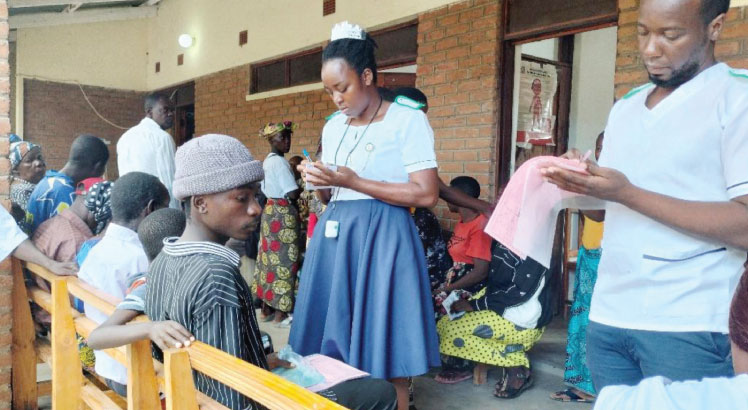Managing NCD burden among youth
Elube Mhone, 18, from Karonga experienced blindness for six months due to type one diabetes mellitus complications. The metabolic disease, populary known as diabetes, results from elevated blood glucose level.
Two years prior, she was a regular outpatient at Nyungwe Community Hospital in Karonga. The condition interrupted her learning at Ngala Community Day Secondary School.
Elube was only screened and diagnosed with diabetes after losing her sight in October of last year. Signs and symptoms had been accumulating during her outpatient visits, with the worst being when she was suspected of being pregnant due to her consecutive hospital visits.
“She used to sweat a lot and drink a lot of water. During one of the visits to our local clinic, my sister was subjected to a pregnancy test, which turned out negative. Throughout the two years of her struggle, she was never screened for diabetes and the situation worsened until she became blind,” explained Elube’s sister and caregiver Oreen Mhone.
The turning point came one morning when Elube failed to see the new day. Despite opening her eyes, she was engulfed by deep darkness.
She recalls: “I couldn’t believe what was happening. I woke up in total darkness, and each time I opened my eyes, my hopes of regaining my vision were shattered.
“I cried out loud, but the situation didn’t improve as weeks and months went by. This ordeal hurt me deeply.”
Due to her illness, Elube became isolated, experiencing loneliness, rejection and stigma.
In March this year, Elube was referred to Karonga District Hospital where she underwent a successful operation that restored her eyesight. She now hopes to return to school.
“Being out of school for over two years has been a significant setback in my life. Nonetheless, I am thankful to the hospital staff for restoring my sight. I hope to find my place,” she says, beaming with hope.
Karonga District non-communicable diseases (NCD) and Pen Plus coordinator Luckson Chiphiko emphasises the importance of early screening for NCDs.
He highlights Elube’s case as a clear example of the need for timely intervention.
Karonga District introduced a special NCD clinic in July last year and the facility has so far facilitated faster identification of NCD cases through mass community screenings.
Additionally, a standalone NCD structure is being constructed to enhance patient care.
During a supportive supervision visit by Unicef, Partners in Health, UNDP, World Diabetic Foundation, Hemsley Charity Trust and the Ministry of Health, records showed that the Karonga NCD Clinic has served 533 patients, including 321 children under the age of 18.
During a similar visit to Rumphi District Hospital, the team learnt that as of April, the district had registered 1 678 NCD patients.
Rumphi district medical officer Dr. Tapunda Phiri calls for increased investment in the detection, management, treatment and care of NCDs.
He says: “In our case, we face staff shortages and the workload can become overwhelming. The availability of NCD drugs is also inconsistent.
“Given the resources, we need more outreach services to cater for clients who live far away.”
Dr. Phiri highlights that Unicef trained staff in advanced NCDs management through Partners in Health in Rumphi.

According to Unicef, NCDs pose significant challenges to the dreams of children due to many unmet needs.
Unicef Malawi health specialist Dr. Mesfin Senbete reiterates the importance of playing an active role in addressing NCDs so that children suffering from NCDs are not left out of the health system and care.
He says: “Children and young people with NCDs require necessary support to survive and thrive.
“We need to ensure that children that have NCDs, especially from underprivileged families access comprehensive health care.”
Unicef, with support from partners such as Eli Lilly and Hemsley Charity Trust, is supporting some districts to fill the NCD gaps identified by the Ministry of Health.
“It is just a start-up, there is need for more investment,” Senbete said.
The Malawi National Action Plan for the Prevention and Management of Non-communicable Diseases (2017-2022), initiated by the Malawi Government, aims to elevate the priority of NCDs. This plan was
designed to establish and bolster national policies and plans for the prevention and control of these diseases.





